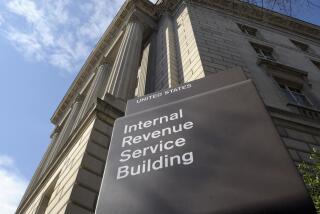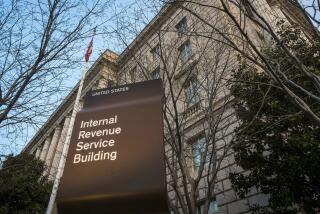Some Advice on How to Survive an IRS Audit
- Share via
It is every taxpayer’s nightmare. It generally starts with a notice in the mail saying the Internal Revenue Service wants more documentation about a series of deductions. It often ends with a 90-day letter that advises the taxpayer had better pay the U.S. government a substantial sum or face tax court.
It is the dreaded IRS audit.
Tax experts maintain that getting through a government audit is mostly a matter of honesty and organization.
The IRS audits tax returns based on a computerized scan. The computer assigns points to various items, such as unusually high business expenses or charitable contributions. The more points you have, the more likely you are to be audited.
The trick is that, other than the IRS, no one knows exactly how many points will trigger an audit. Another of many secrets is what level of charitable contributions will result in the taxpayer’s scoring audit points.
The government does publish statistics on what average deductions are for a few items, such as interest expense. The problem is, these statistics are dated--the latest available are from the 1988 tax year. And, more importantly, having “average” deductions does not preclude an audit.
However, if your deductions are far in excess of the averages in a number of categories, there is a reasonably good chance that you’ll get singled out for closer review, accountants say.
The average itemized deduction statistics are listed in the 1991 Master Tax Guide, published by the Commerce Clearing House. The averages vary by income, but, for example, taxpayers with adjusted gross income between $25,000 and $30,000 deduct roughly $2,462 for medical and dental expenses and $1,075 for charitable contributions.
Accountants maintain that there are other “hot spots” that tend to encourage audits. These are potentially controversial items that the IRS tends to focus on at different points in time. Although what they are in any given year is generally only a matter of speculation, they have included deductions for home office expenses, business meals, money-losing limited partnerships and deductions for certain business losses.
You should not forgo a deduction just to avoid an audit. However, you probably want to be very careful about documenting related expenses. Save receipts and keep contemporaneous logs. Make a note of what you talked about at a business meal, for example.
Simple sloppiness can also single your return out for audit, said Gregg Ritchie, partner at the accounting firm of KPMG Peat Marwick. If there are mathematical errors or missing schedules, your return is likely to be kicked out of a machine and personally reviewed.
Once an audit is launched, consumers need to decide whether to handle it themselves or hire a professional. This decision will likely hinge on how much money is at stake and how comfortable the taxpayer is with the veracity of the return.
Then the individual needs to get organized. Don’t hand an IRS agent--or your accountant--a shoe-box full of receipts. It will annoy the IRS and it will cost you a bundle if you give it to your accountant to organize for you.
Most individuals will have received a letter that details what the IRS wants to know. Before arriving at the local IRS office to provide that information, put documentation for those items together in categories and include an adding machine tape verifying your arithmetic.
Consumers might also be wise to go to a law library and find a copy of the Internal Revenue Manual. This is the IRS’ “playbook,” Ritchie says. It should give taxpayers a clear idea of what the auditor is going to ask and what sorts of documents they will require for each type of deduction.
Remember that the burden of proof is on the taxpayer, so always err on the side of having too much documentation rather than too little.
Tax advisers suggest that individuals start the audit with information pertaining to deductions that are best supported by receipts and contemporaneous documents, such as mileage logs. If the taxpayer has excellent documentation for the first several items, the agent might let them get away with less substantial evidence for the remaining deductions, says Bernard Oster, partner at the business law firm of Cohen Primiani & Foster in Los Angeles.
Individuals also need to be circumspect about how they answer questions, tax advisers maintain. Those who have hired a professional to represent them may be discouraged from attending the audit. Heed that advice.
Many consumers are harmed by volunteering too much information or by acting hostile. IRS agents are human. And they will be affected if the taxpayer acts suspicious or nasty, Ritchie says. Saying “I’ve always done it this way” is likely to spur the agent to pull previous returns for audit as well.
If the audit results in additional tax being assessed, you may appeal through the IRS or go to tax court. The IRS also arranges payment plans for those who owe back taxes but can’t afford to pay in one lump sum.
More to Read
Inside the business of entertainment
The Wide Shot brings you news, analysis and insights on everything from streaming wars to production — and what it all means for the future.
You may occasionally receive promotional content from the Los Angeles Times.










